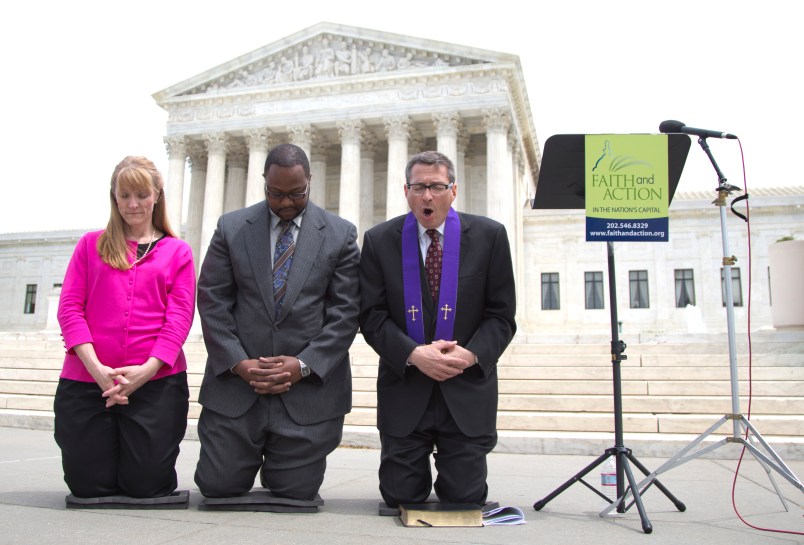Earlier this year, the Supreme Court gave its blessing to local governments that want to open their public meetings with religious prayer.
It was a victory for the town board of Greece, N.Y., which stressed that it was fighting not just for Christian prayer but for the right of all people express their views regardless of their faith. In a 5-4 ruling along ideological lines, the Court ruled against the Jewish and atheist plaintiffs, who argued that the practice violated the establishment clause of the First Amendment.
Less than four months later, the town of Greece has adopted an invocation policy that excludes non-religious citizens and potentially shuts out faiths that aren’t well-established in the town, according to a top secular group.
Seeking to “avail itself of the Supreme Court’s recognition” that government prayer is constitutional, the new policy restricts opening remarks to “assemblies with an established presence in the Town of Greece that regularly meet for the primary purpose of sharing a religious perspective.”
Translation: atheists and agnostics need not apply. And unless the board clerk decides that your faith has an “established presence” in the New York town of fewer than 100,000, you may not deliver an invocation.
Barry Lynn, the executive director the Americans United For Separation of Church and State, torched the new policy as unconstitutional and a warning sign for cities and towns all across the United States which may seek to adopt a similar policy.
“They said they’re open to anybody. Now they’re not open to anybody,” Lynn told TPM. “It’s really a scam. This is a way to go back to business as we had sadly always expected it. They only want religious people — frankly they only want Christians — to participate. This is a step backward.”
Lynn, whose secular organization represented the plaintiffs and lost in the Supreme Court, argued that Greece’s new policy was inconsistent with the majority decision. In it, Justice Anthony Kennedy described public prayer as a “larger exercise in civic recognition” designed to “represent rather than to exclude or coerce nonbelievers.”
Town Attorney Brian Marianetti defended the new rules to the Rochester Democrat & Chronicle, which first reported on the policy and published it online.
“I don’t feel that the policy in any way singles out or discriminates against any form of belief,” he told the paper.
The Democrat & Chronicle also spoke to an atheist in the town, Dan Courtney, who had delivered a secular invocation at the town board meeting in July, and fretted that he would no longer be able to do so. He expressed shock that the town would be “quite so blatant about the discrimination they wish to impose.”
The new rules adopted by Greece reflect a policy proposed by the Alliance Defending Freedom, a conservative Christian law group based on Scottsdale, Ariz. which is pitching the same idea to other towns and cities.
Justice Elena Kagan warned that the decision in Greece v. Galloway could lead to discrimination against minority faiths. In her dissent for the minority, she accused the conservative justices of “blindness” to the “essential meaning of the religious worship in Greece’s town hall, along with its capacity to exclude and divide.”







Worst SCOTUS EVER.
I wonder how the taxpayers of Greece, NY, feel about having their hard-earned money going towards defending lawsuits. I hope they like it, because there’s another one warming up in the bullpen.
Clear-cut religious bigotry.
Elections have consequences. No Ralph Nader, no victory in Florida for George W. Bush. No victory in Florida, no President George W. Bush. No President Bush, no Justices Alito and Roberts. No Alito and Roberts, no Citizens United and no Hobby Lobby.
So many TeaXians
…but a/gnostics-theists are working on a better strain of lion,